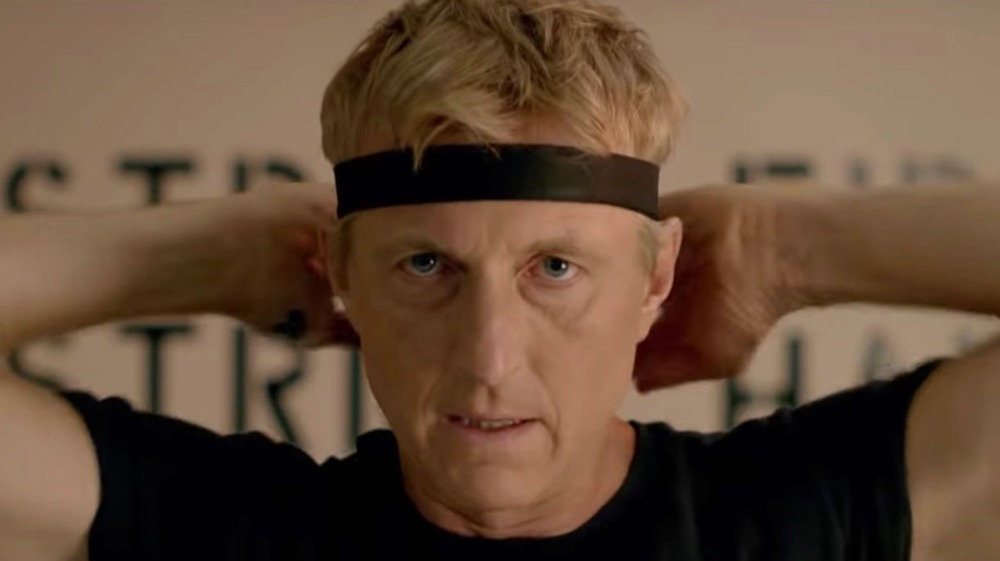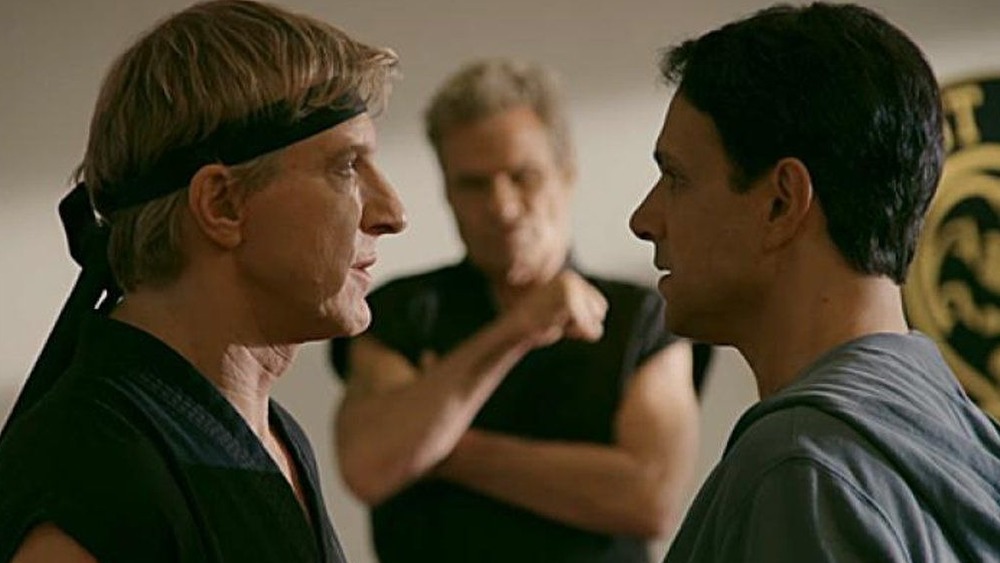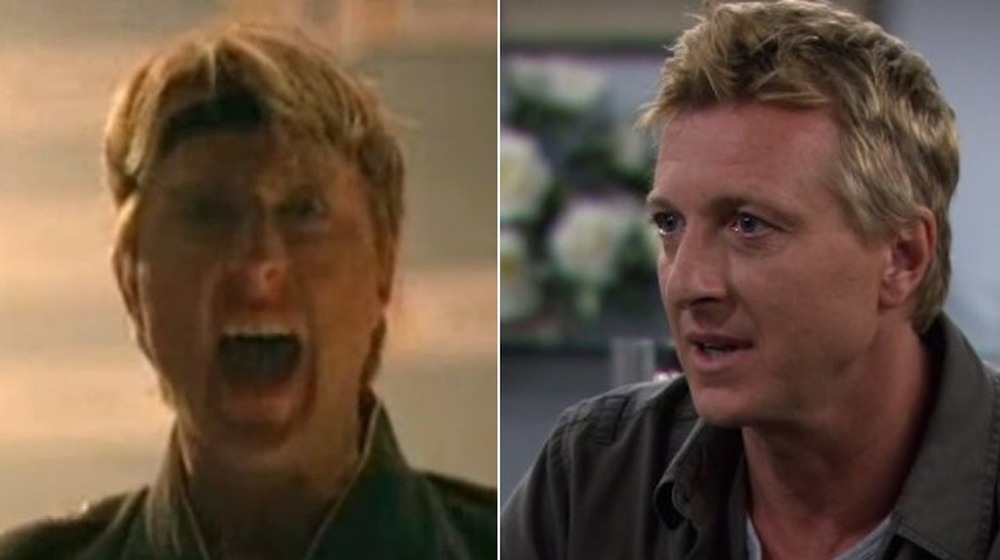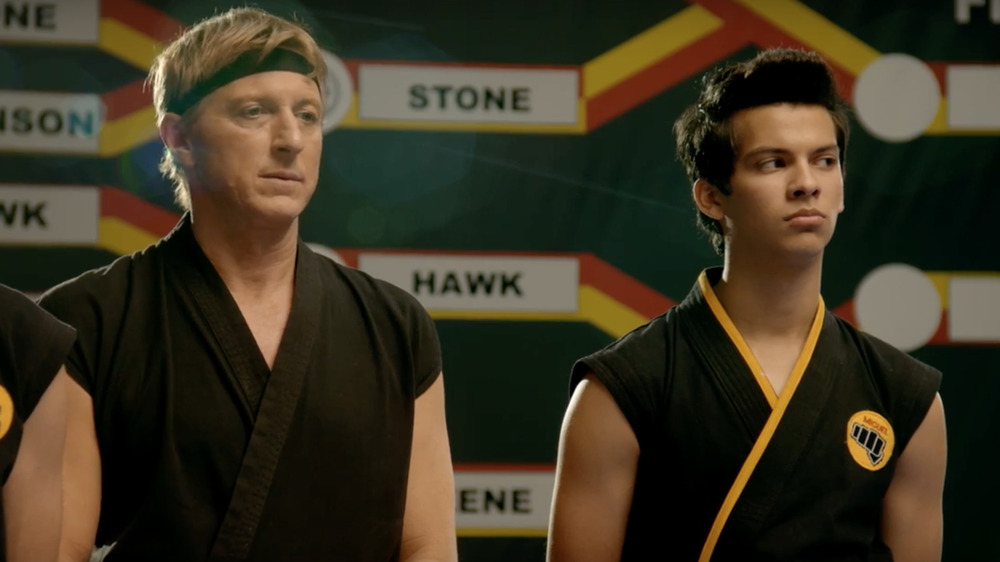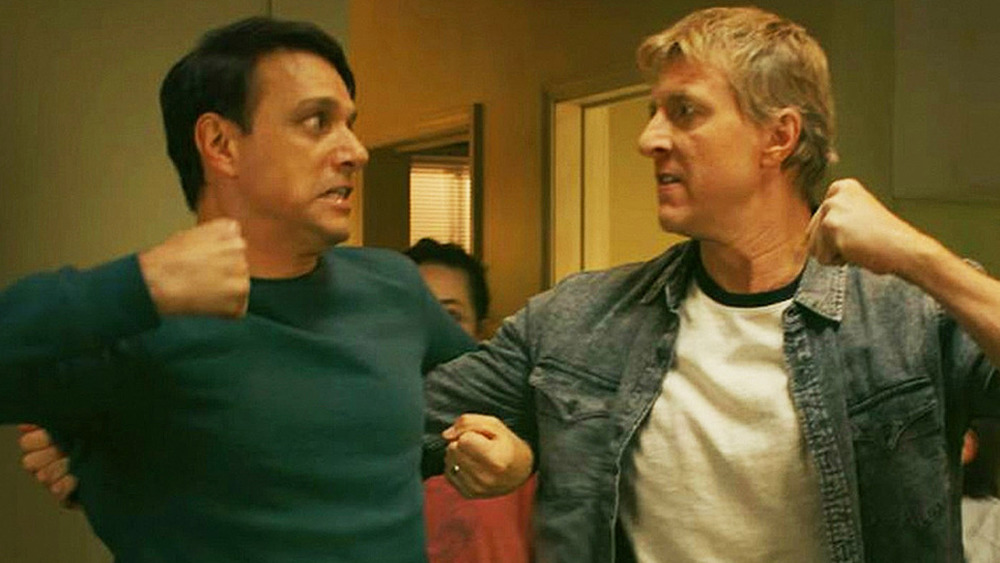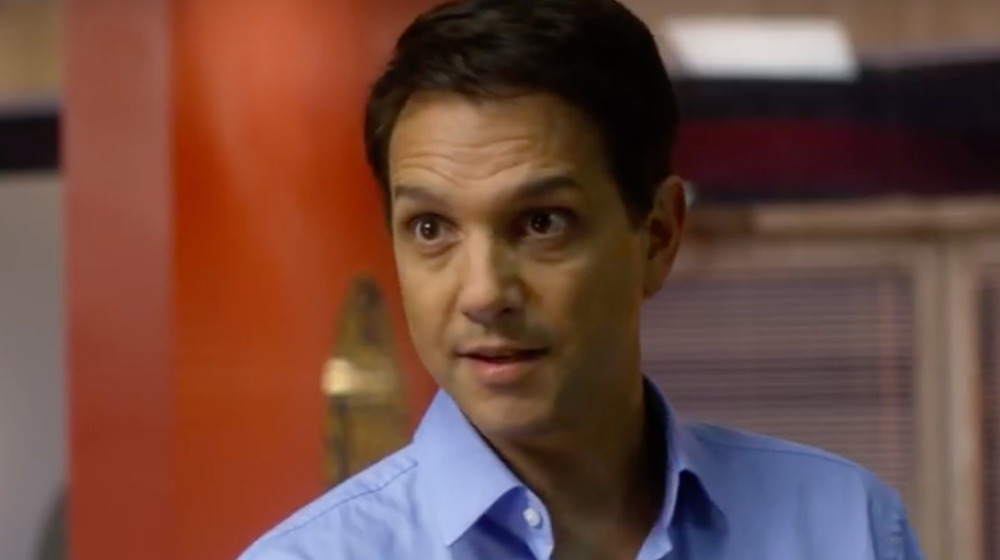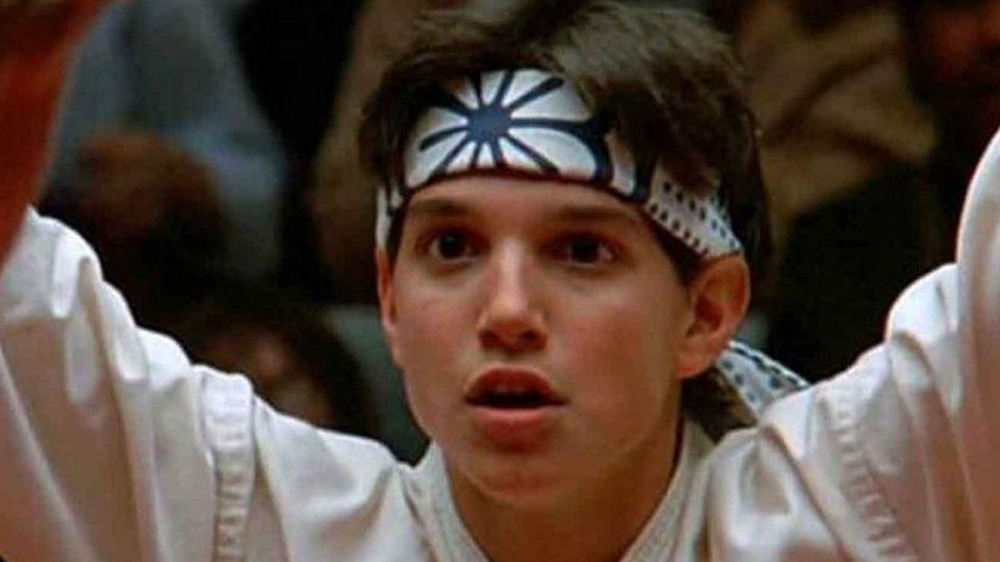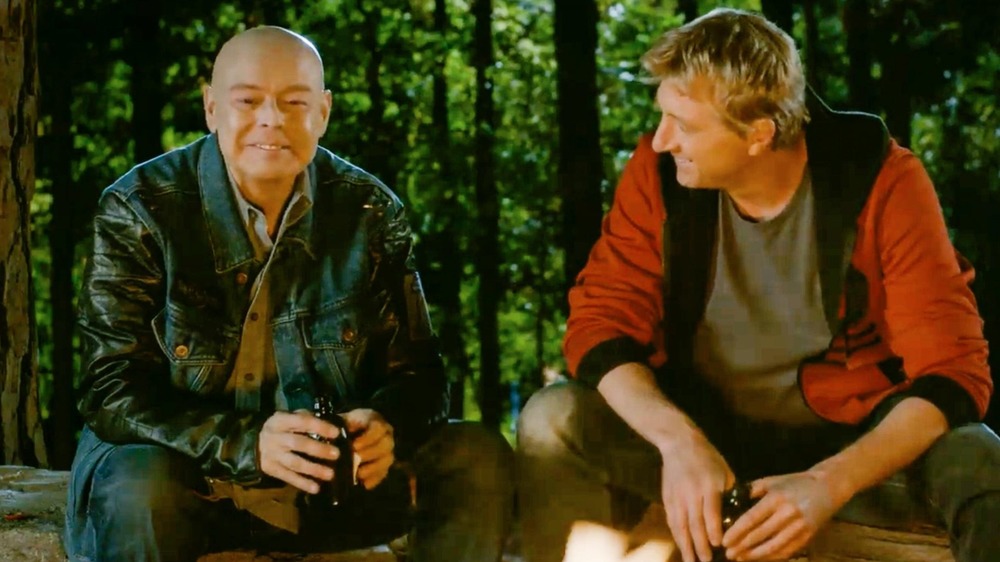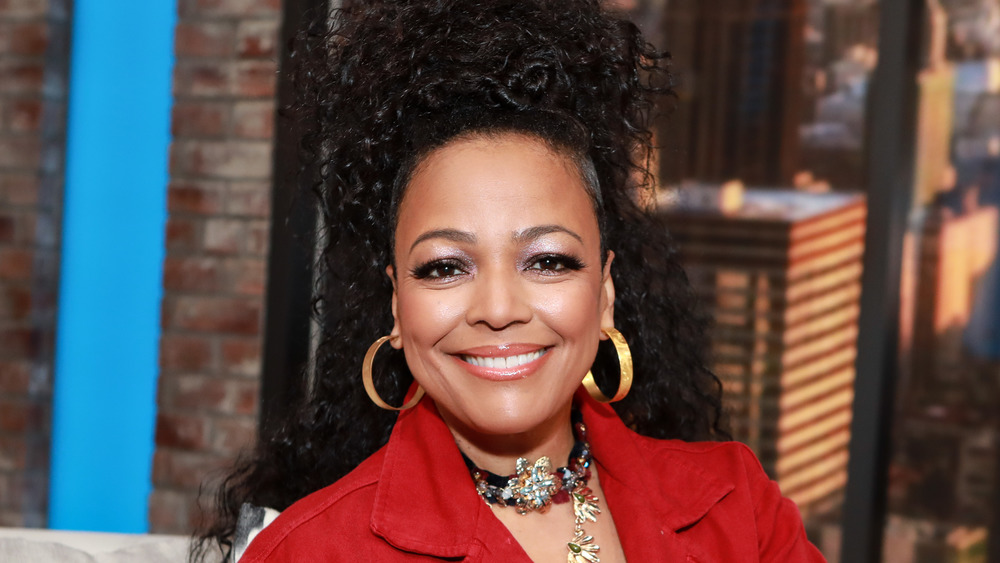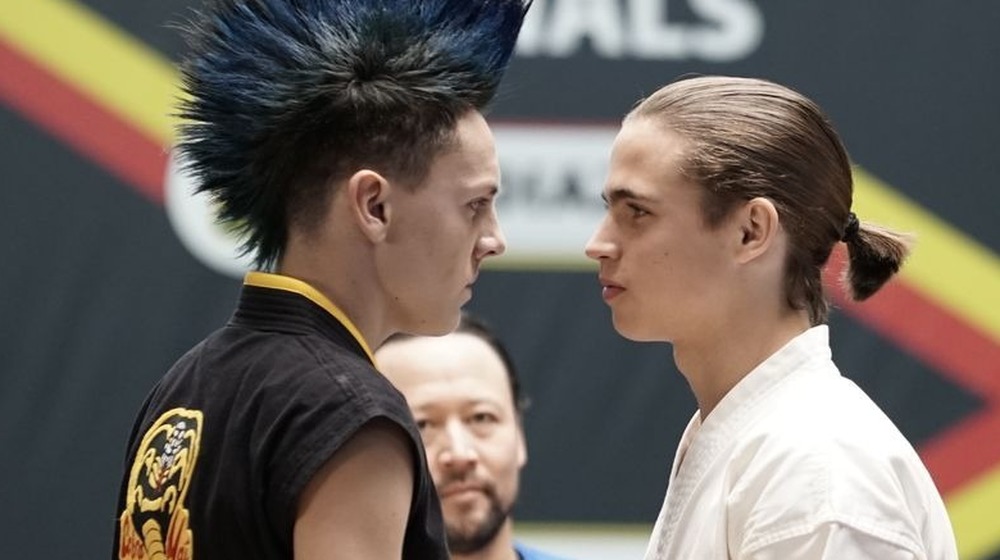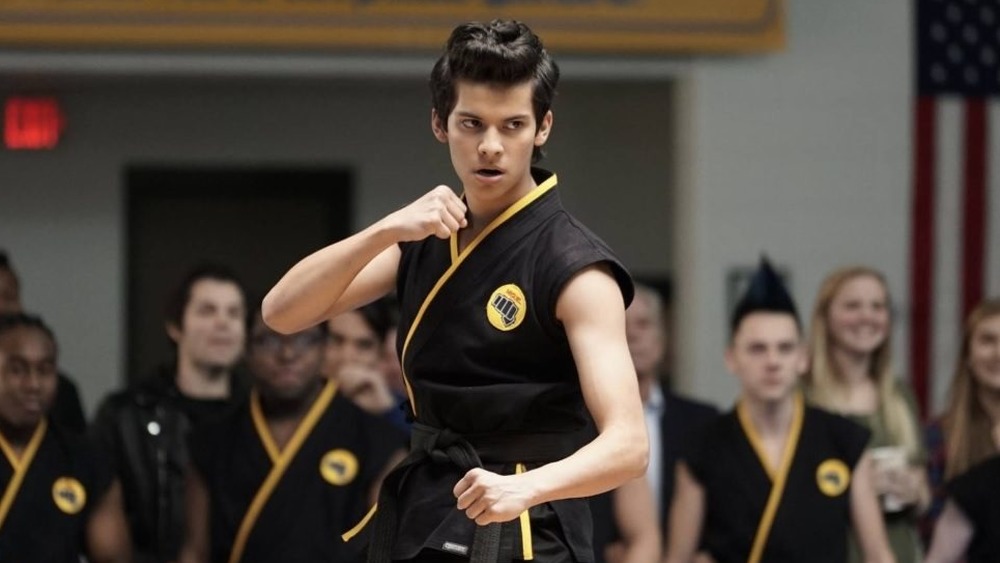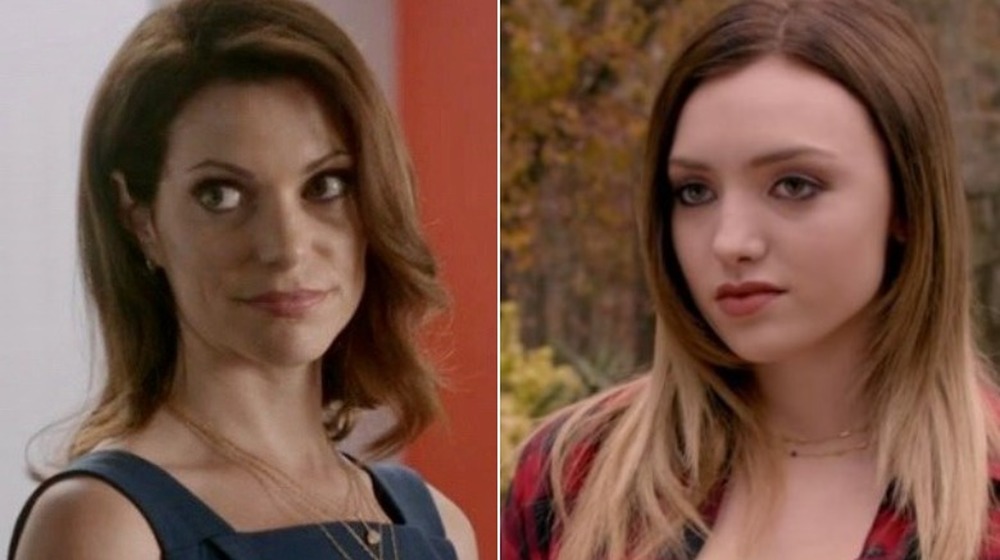The Untold Truth Of Cobra Kai
The Karate Kid is one of the most definitive teen movies of the 1980s, an era full of teen movies. Ralph Macchio starred as Daniel LaRusso, a new kid in town who learns karate from the wise Mr. Miyagi (Pat Morita) which he uses to defeat the bullying members of the violent and underhanded Cobra Kai dojo. Leading the villains: Johnny Lawrence. As portrayed by William Zabka, Johnny is the very example of an '80s teen movie villain: rich, blonde, sniveling, and who pushes around a weaker kid mostly for kicks. Johnny gets his comeuppance (via an expert crane kick from Daniel) in the All Valley Karate Tournament. But what became of Johnny after karate — the pursuit that defined him — was summarily taken away from him? He became a beer-guzzling divorced guy on the other side of 40 who starts teaching karate to get his life on track.
That's the premise of Cobra Kai, a modern-day dramedy that continues the story of The Karate Kid, as told from the perspective of Johnny Lawrence. Here's everything there is to know about the breakout streaming hit. Now sweep the leg!
Every streamer in the business wanted Cobra Kai
The first two seasons of Cobra Kai, released in 2018 and 2019, debuted exclusively on YouTube Red. Later renamed YouTube Originals, the subscription-based streaming service offered ad-free and original, long-form, scripted entertainment, including Step Up: High Water, Wayne, and Origin. But Cobra Kai was easily the most high-profile and thus signature series on the fledgling streamer, one of many in an increasingly crowded field that also includes industry champs like Netflix, Amazon Video, and Hulu.
In fact, all three of those stalwarts were highly interested in acquiring Cobra Kai for its large libraries of original content. The pitch meetings to executives at those companies (along with cable network AMC) were just that dynamic, with stars Ralph Macchio and William Zabka personally showing up in character to help producers sell the show. "I don't know whether they had rehearsed it, but they played the parts of their characters well. More than anything, it was just amazing to see them together again," YouTube head of originals Susanne Daniels told The Hollywood Reporter.
The video site won the competitive bidding fight but in the end, lost the war. Cobra Kai wound up on Netflix after all for its third season in 2021 (and a planned fourth season, too). The reason: YouTube got out of the business of making serialized, scripted original series.
Two comical Karate Kid homages led to Cobra Kai
The idea of Cobra Kai came from an unmade movie of the same name by the show's creators, but the execution of the show — a self-referential, comedy-laced drama about the further adventures of a washed-up Johnny Lawrence — can be traced to two loving homages.
In 2007, No More Kings, a pop culture oriented band whose work has made reference to '80s stuff like Knight Rider and Short Circuit, released a video for "Sweep the Leg," a song named after one of the most famous lines from The Karate Kid, given by Sensei Kreese (Martin Kove) to Johnny in the All Valley Karate Tournament. In the hit video, William Zabka (who also directed) portrays a middle-aged Johnny, living in a trailer with his Cobra Kai gang, still hung up on his All Valley loss, and squaring off against No More Kings' Pete Mitchell. In the end, the fight was all a dream, but then Johnny gets run over by Ralph Macchio.
In 2013, Zabka took another ironic view at his most famous role, guest-starring as a version of himself on seven episodes of How I Met Your Mother. The final season of the series is set almost entirely over the course of the wedding weekend for Barney Stinson (Neil Patrick Harris), a cutthroat and goal-oriented bro-type. Zabka garners an invite to the nuptials because Barney, a huge Karate Kid fan, thinks that Johnny Lawrence is the true hero of the movie.
Cobra Kai wouldn't have happened without another reboot
Since around 2016, reboots have been the name of the game in television. Vintage shows like The X-Files, Twin Peaks, Will and Grace, and Roseanne have all returned, paving the way for Cobra Kai, an episodic continuation of The Karate Kid, 30 years after the fact. That's by no means the first time Hollywood has tried to bring back The Karate Kid. The Next Karate Kid, a soft reboot of the film series with Hilary Swank replacing Ralph Macchio, flopped, while a 2010 remake starring Jaden Smith and Jackie Chan was a blockbuster hit, showing that modern audiences were interested in the franchise
But it was another revival from long ago that directly helped Cobra Kai develop. Creators Josh Heald, Jon Hurwitz, Hayden Schlossberg were all successful screenwriters, and their dream project was "our own Karate Kid movie called Cobra Kai, where we would catch up with these characters and delve deeper into the life and psyche of the man in black, Johnny Lawrence," Heald wrote in The Hollywood Reporter. Business considerations prevented that film from ever happening, until one day the creators saw a billboard in Los Angeles advertising Fuller House, Netflix's Full House continuation, featuring Andrea Barber as annoying neighbor Kimmy Gibbler. "If we now lived in a world where Kimmy Gibbler could be on a billboard, then so could Johnny Lawrence." And so, the trio set about turning their movie idea into a TV series.
Getting the rights to The Karate Kid was difficult and then delightful
Once Karate Kid superfans and Hollywood screenwriters Jon Hurwitz, Hayden Schlossberg, and Josh Heald decided to pursue Cobra Kai as an episodic, small-screen series, the first order of business was to secure the adaptation rights.
That was a complex feat, as The Karate Kid was a production of Columbia Pictures, later acquired by Sony. The entertainment conglomerate owned a piece, as did the estate of late film producer Jerry Weintraub, and Overbrook Entertainment, movie star Will Smith's company, which brought the 2010 Jaden Smith Karate Kid movie to life. Hurwitz, Schlossberg, and Heald were prepared to fiercely negotiate with Overbook creative head Caleeb Pinkett.
"We went into that meeting thinking that we would say to him you can still have the movie universe and if Jaden wants to do another Karate Kid feature you can still do that, but like Marvel, there's now a TV show and the movies," Hurwitz told Business Insider. Instead, Pinkett didn't need much convincing at all, and he offered to talk to the Weintraub estate on behalf of the Cobra Kai team. When the rights meetings moved to Sony, Pinkett again stepped up. "He was the one fighting the fights in our meetings," Hurwitz said.
Ralph Macchio was a late addition to Cobra Kai
After landing the proper legal and business clearances to even consider making Cobra Kai, the creators really needed the involvement of two individuals to ensure their project would get produced: Karate Kid stars William Zabka (Johnny Lawrence) and Ralph Macchio (Daniel LaRusso). The former was an easy sell. "We knew William pretty well, having previously worked together," on Hot Tub Time Machine, Josh Heald told The Hollywood Reporter. "And right away he trusted our instincts with shepherding Johnny Lawrence into the new millennium."
Landing Macchio would be trickier. "None of us knew him but we had heard he was very hesitant to engage with anything Karate Kid related over the years," Heald told Business Insider. "He had spent 30 years turning down anything related to The Karate Kid, much preferring the safety of letting Daniel LaRusso's legacy stay in the past," he explained to The Hollywood Reporter.
The creative team remained persistent and eventually secured a lunch date with Macchio. "And that lunch turned into a four-hour lunch where we pitched him the whole show." After a couple of two-hour phone calls in the following days, "by the end of that week Ralph was in."
How Cobra Kai got its Karate Kid flashbacks
Johnny Lawrence's surprising loss to Daniel LaRusso in the All Valley Karate Tournament back in 1984 looms large over Cobra Kai — it's seemingly the definitive event or turning point in the life of William Zabka's character. What was once a life of privilege, pride, and arrogance unwound, and when the events of the show begin, Johnny is divorced and way down on his luck. Cobra Kai is the Karate Kid story from his point of view, and as such, involves new footage of the All Valley tournament.
"There are angles and shots in some of the flashbacks from Johnny's point of view and from Daniel's point of view," co-star Ralph Macchio told Uproxx. Cobra Kai's crew gained access to the archives of Karate Kid production company Columbia Pictures, "and they were able to use footage from the film that was never in the movie."
According to co-creator Jon Hurwitz in Entertainment Weekly, "incorporating unused camera angles of Johnny and especially a close-up of him getting kicked in the face by Daniel's famous crane kick really helped us achieve our vision."
Why some of Johnny's friends returned to Cobra Kai and others didn't
Likely the most moving episode of Cobra Kai is the second-season installment "Take a Right." Johnny's old Cobra Kai karate buddy Tommy (Rob Garrison) — the one who screams "Get him a body bag!" in relation to Daniel LaRusso at the All Valley Karate tournament in The Karate Kid — pops up. He spends a day riding motorcycles, drinking, and going on a camping trip with his old friends. At the end, Tommy dies, sadly and eerily echoing and foreshadowing Garrison's real-life death in September 2019 at age 59. (The final image of Tommy in the Karate Kid universe comes in Cobra Kai when, fittingly, he's placed into a body bag.)
Joining Johnny and Tommy in "Take a Right" were Karate Kid characters Bobby and Jimmy. Ron Thomas and Tony O'Dell returned to play them, with only Chad McQueen as Dutch the only Cobra Kai holdout. "We actually talked to Chad," show co-creator Josh Heald told Entertainment Weekly. "Schedules were such that it wasn't feasible for him to join us this time around, but we certainly mentioned his character being alive and in a very particular place on purpose." Writers explained that Dutch had wound up in prison.
Kim Fields' vocal support of Cobra Kai won her a role on the series
Cobra Kai trades heavily in nostalgia, consistently evoking its widely beloved '80s source material, The Karate Kid. But original film cast members William Zabka, Ralph Macchio, and Martin Kove reprising their respective roles aren't the only friendly or at least familiar faces in Cobra Kai. Kim Fields pops up in the second-season episode "The Moment of Truth" as Sandra, mother of Cobra Kai karate student Aisha (Nichole Brown). Fields is of similar pop cultural vintage as Zabka and Macchio, having also become a teen idol and young star in the '80s with her role as Tootie on The Facts of Life (although she's just as recognizable for her work on the hit '90s sitcom Living Single).
So why the highly visible cameo for a former teen star not connected to the Karate Kid universe? Thank Twitter. After the first season of Cobra Kai premiered on YouTube Red, Fields frequently talked up the series on the social media platform, strictly as a fan. "She absolutely loved the show, and she and I started a little bit of a dialogue," co-creator Jon Hurwitz told Entertainment Weekly. When preparations for the second season began, Hurwitz and his collaborators knew they wanted to include Aisha's mother and thought of Fields, who, as luck would have it, lives in Atlanta where Cobra Kai shoots.
The Cobra Kai kids are formidable martial artists
Cobra Kai is a continuation of The Karate Kid movies, focusing in part on kids learning karate from two former teenage masters of the form, Daniel LaRusso and Johnny Lawrence. Some of those young adults, or "kids," if you rather, are actually quite good at karate and other martial arts techniques — bringing levels of realism and intensity to their Cobra Kai fight scenes.
Jacob Bertrand, who plays Hawk, began regular karate at 8-years-old and attained the rank of purple belt before losing interest, but re-entered karate lessons two months before shooting his first scenes. Tanner Buchanan (Robby Keene) approached a black belt in taekwondo, then moved into Muay Thai boxing — just before he landed Cobra Kai, he'd completed an eight-month training regimen. Xolo Maridueña (Miguel) was less experienced than those co-stars. "I had taken a year or so of karate when I was very young," he told The Wrap. "I never really got into it until booking the first season of Cobra Kai. Playing the role involved a two-to-four hour daily training schedule that included martial arts, boxing, strength training, and yoga.
Cobra Kai episode titles are loaded with meaning
Because it takes place in the universe of The Karate Kid films, Cobra Kai is filled with references big and small to the '80s franchise. They're also embedded in a place where viewers may not think to go Easter egg hunting — the titles of individual episodes of the show, unceremoniously listed for navigational purposes on the Cobra Kai series page on Netflix. "When launching Cobra Kai, we decided our titles should be not only thematically linked to episode content, but sometimes nods to the original movies," co-creator Josh Heald told Entertainment Weekly. For example, the first Cobra Kai episode, which establishes that Johnny's life has been on the skids since losing the All Valley Karate Tournament to Daniel LaRusso three decades earlier, is titled "Ace Degenerate," something one of Johnny's friends positively labels him in The Karate Kid.
In the first Karate Kid, Cobra Kai dojo leader Kreese says that "an enemy deserves no mercy," and that's alluded to in the names of the season one finale, "Mercy," and the season two finale, "No Mercy." The second season also nods to Karate Kid soundtrack cuts — "The Moment of Truth" is named after the song of the same name by Survivor, which plays in the first film, while "Glory of Love" gets its title from the Peter Cetera hit from The Karate Kid Part II.
Two Cobra Kai cast members thought they blew their auditions
Among the new additions to the cast of Cobra Kai, or those who weren't in a Karate Kid movie, is Courtney Henggeler, who portrays Daniel's wife Amanda LaRusso. Henggeler's resume includes dozens of credits going back two decades, including a recurring role as Sheldon's sister, Missy, on The Big Bang Theory. At the time of her audition, Henggeler was ready to quit acting. "I just had my baby and I was like, 'I don't even know if I even want to go back,'" she told the Daily Actor.
After realizing that acting paid her health insurance, Henggeler went on the Cobra Kai audition, even though she initially thought it was "ridiculous" to remake The Karate Kid and bemoaned Hollywood's lack of originality. She ultimately enjoyed the show but still fell "out of place" among Macchio and William Zabka, "these idols of mine."
Peyton List, who joined Cobra Kai in the second season as Tory Nichols, a tough Cobra Kai dojo student, didn't have the same luxury of time as Henggeler did to weigh the pros and cons of her role, but still didn't think she'd book it. "I received the audition super last minute, the night before, and never in my wildest dreams would've thought I could play the character," List, best known for playing more straight-laced individuals on Disney Channel fare, told Glitter. "It was such a happy shock when I got it."
